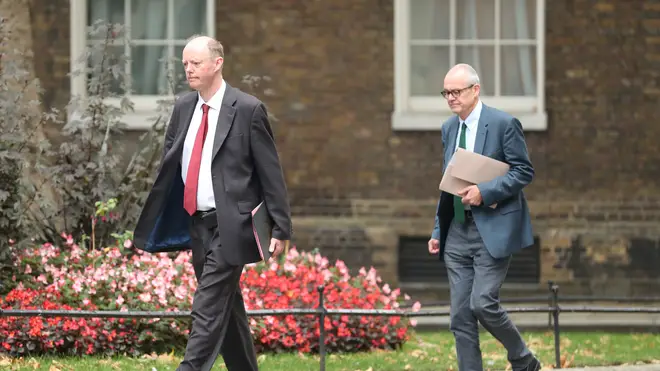
Henry Riley 7pm - 10pm
21 September 2020, 14:14 | Updated: 21 September 2020, 15:21

Chief medical officer Professor Chris Whitty and chief scientific adviser Sir Patrick Vallance used a press briefing to set out their growing worry over the spread of coronavirus in the UK. But what were the key points?
It comes as Prime Minister Boris Johnson, who is expected to hold a press conference on Tuesday, spent the weekend with senior ministers and advisers discussing what action to take as the rise in the number of new cases showed no sign of slowing.
Earlier, Health Secretary Matt Hancock said a "mass roll-out" of a vaccine could be seen in the early part of next year if trials go well.
Follow our coronavirus live blog here
He added: "Hopefully in the first few months - there's still a chance of it coming on stream before Christmas, but we've then got to roll it out and the first people who will get it are the people who are most vulnerable - people in care homes, older people.
"There's a series of different vaccines, but we are talking about - essentially, for it to have an impact on how we live our lives - we're talking about the start of next year."

Caller relieved after listening to CSA and CMO speak independently
Here are the key points from the CMO and CSO's 20-minute presentation from Downing Street on Monday:c
Sir Patrick warned there could be 50,000 coronavirus cases per day next month, leading to 200-plus daily deaths, if the rate of the disease's spread was not tackled.
He also explained that less than 8 per cent of the UK population are thought to have coronavirus antibodies to fight off infection, making the "vast majority" of people "susceptible" to the deadly virus.
The Government's chief scientific adviser added that antibodies in city populations were a "little higher" and that as many as 17 per cent of people in London could have them, making the spread slower in those areas.

Sir Patrick Vallance warns of nearly 50,000 cases per day in mid-October
Sir Patrick said it was not the case that the rise in coronavirus in the UK was down to more testing being carried out.
"Could that increase be due to increased testing? The answer is no. We see an increase in positivity of the tests done - so we see the proportion of people testing positive has increased, even if testing stays flat."
Prof Whitty said there were now "significant rates of transmission" of coronavirus in the UK, with the "great majority" of areas facing an increase.

Theo Usherwood dissects CMO and CSA's joint coronavirus briefing
The chief medical officer for England hinted at curbs to social lives being needed to prevent coronavirus spiralling out of control, saying "we have to break unnecessary links between households because that is the way in which this virus is transmitted".
Prof Whitty said there was a "very difficult balance" to be struck between preventing the NHS from being "overwhelmed by a huge spike" in cases and a second economic lockdown that could cause unemployment, poverty and deprivation, outcomes which would bring their own "long-term health effects".
The UK, said Prof Whitty, must face up to a "six-month problem" as the colder weather arrives, telling the nation: "At this point the seasons are against us, we're now going into the seasons - late autumn and winter - which benefit respiratory viruses, and it is very likely they will benefit Covid, as they do, for example, flu."
Prof Whitty suggested science would eventually "ride to our rescue" but that in the next six months it would have to be taken very seriously.
He said: "Lots of people have said maybe this is a milder virus than it was in April.
"But I'm afraid, although that would be great if that were true, we see no evidence that is the case."

James O'Brien's instant reaction to Chris Whitty's speech
The rise in Covid-19 cases among young people would "move up the age bands" to older people, who are more at risk of dying of coronavirus symptoms, Prof Whitty warned.
He called for a collective effort to subdue the second wave of Covid, saying: "You cannot in an epidemic just take your own risk, unfortunately you're taking a risk on behalf of everybody else."
There is a possibility that small amounts of vaccine could be made available to certain groups of people by the end of the year, according to Sir Patrick.
He added: "We don't yet know they will work but there is increasing evidence that is pointing in the right direction and it is possible that some vaccine could be available before the end of the year in small amounts for certain groups.
"Much more likely that we'll see vaccines becoming available over the first half of next year, again not certain but pointed in the right direction, which then of course gives the possibility of a different approach to this virus."
There are more than 240 vaccine trials taking place across the world, with more than 40 in clinical trials.
Nine of the trials are in the later stages, at phase two or three, including the University of Oxford's vaccine trial.